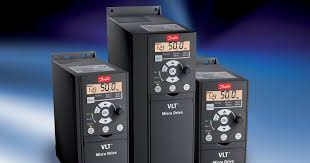Danfoss drives have become an essential component in industries ranging from HVAC to renewable energy, offering enhanced control over motor speed and energy consumption. Whether you’re looking to optimize your industrial processes or reduce your carbon footprint, Danfoss drives and inverters are key to achieving these goals.
What are Danfoss Drives?
Danfoss drives are electrical devices designed to control the speed and torque of electric motors. They are widely used in various industries for their ability to improve process control, energy efficiency, and system performance. Let’s dive deeper into why Danfoss drives are leading the way in modern automation solutions.
Understanding Danfoss Drives
Overview of Danfoss Drives
Danfoss drives, also known as variable frequency drives (VFDs), are used to control the speed of electric motors by varying the frequency and voltage supplied to the motor. This not only enhances motor control but also provides a significant reduction in energy consumption, especially in applications where motors do not always need to run at full speed.
Key Benefits of Danfoss Drives
- Energy Efficiency: Danfoss drives help in optimizing energy use, leading to lower operational costs.
- Enhanced Motor Control: They provide precise control over motor speed and torque, allowing smoother operations.
- Extended Equipment Life: By reducing mechanical stress on motors, Danfoss drives contribute to longer equipment lifespans.
- Eco-Friendly: Danfoss drives align with global energy-saving initiatives, helping reduce carbon emissions.
Types of Danfoss Drives
Danfoss offers a range of drive solutions tailored to different industry needs. The two main types of Danfoss drives are VLT drives and Vacon drives.
Danfoss VLT Drives
VLT drives are known for their versatility and reliability. They are commonly used in a variety of industries, including HVAC, water and wastewater management, and food processing. These drives provide precise motor control, optimizing performance and saving energy.
Danfoss Vacon Drives
Vacon drives are specifically designed for heavy industrial applications. These drives are robust and can handle demanding environments such as mining, marine, and oil and gas industries. Vacon drives are built to provide maximum efficiency and reliability even under extreme conditions.
Danfoss Inverter Technology
What is Danfoss Inverter Technology?
Danfoss inverter technology is an advanced method of controlling electrical power through frequency conversion. Inverters convert direct current (DC) into alternating current (AC), allowing for efficient and flexible power management. This technology is at the heart of Danfoss drives, enabling them to manage energy use effectively.
Importance of Inverter Technology
Inverter technology is critical in applications where energy savings and process control are priorities. By allowing motors to run at optimal speeds, Danfoss inverter reduce unnecessary energy consumption and contribute to smoother, more reliable operations.
Applications of Danfoss Drives
Danfoss Drives in Industrial Applications
In industries such as manufacturing and processing, Danfoss drives are used to control conveyor belts, pumps, and other machinery. This ensures that operations run smoothly, efficiently, and with minimal downtime.
Danfoss Drives in HVAC Systems
Heating, ventilation, and air conditioning (HVAC) systems are one of the largest consumers of energy in buildings. Danfoss drives help in regulating fan and pump speeds, leading to significant energy savings and improved indoor climate control.
How Danfoss Inverter Drives Save Energy
Energy Efficiency and Cost Savings
Danfoss inverter drives allow motors to run only at the speed necessary for the job, reducing energy waste. In applications like HVAC, this results in significant cost savings on energy bills.
Environmental Impact
By lowering energy consumption, Danfoss drives reduce the carbon footprint of industries and buildings. This not only benefits businesses financially but also helps meet global sustainability goals.
Danfoss Inverters for Renewable Energy
Role in Solar Power
Danfoss inverters are used to convert the DC power generated by solar panels into usable AC power for homes and businesses. This allows solar energy systems to operate more efficiently.
Role in Wind Energy
In wind energy systems, Danfoss drives are used to control turbine speed, optimizing the energy output and ensuring smooth operation even in varying wind conditions.
Choosing the Right Danfoss Drive
Factors to Consider
When selecting a Danfoss drive, consider factors like the size of the motor, application type, and energy efficiency requirements. Choosing the right drive can greatly enhance the performance of your systems.
Danfoss Product Selection Guide
Danfoss offers an online product selection tool to help customers choose the best drive for their specific needs. This tool takes into account factors like power requirements, application type, and environmental conditions.
Installation and Maintenance of Danfoss Drives
Installation Process
Danfoss drives are designed for easy installation. Following the manufacturer’s guidelines ensures that the drive is set up correctly and operates efficiently from the start.
Maintenance Tips for Long-Lasting Performance
Regular maintenance is key to maximizing the lifespan of Danfoss drives. Simple actions like cleaning filters and checking for firmware updates can prevent issues before they arise.
Latest Innovations in Danfoss Drives
Smart Features and Digitalization
Danfoss is continuously innovating, adding smart features like remote monitoring and control via cloud-based platforms. This allows users to monitor drive performance from anywhere in the world, ensuring optimal efficiency.
Future of Danfoss Drives
The future of Danfoss drives lies in increased digitalization and integration with smart grid systems, enabling even greater energy efficiency and operational control.
Why Choose Danfoss Over Competitors?
Reliability and Durability
Danfoss drives are known for their robust construction and long lifespan, making them a reliable choice for demanding applications.
Global Support and Service Network
Danfoss offers a global network of service centers, ensuring that customers can receive prompt support and replacement parts whenever necessary.
How Danfoss Drives Improve Process Control
Enhanced Motor Control
Danfoss drives allow for precise control of motor speed, which improves the accuracy and efficiency of various industrial processes.
Optimizing Performance in Complex Systems
In complex systems, such as production lines, Danfoss drives ensure that each component operates in harmony, leading to smoother operations and reduced wear and tear on machinery.
Case Studies: Successful Danfoss Drive Implementations
Case Study 1: Industrial Sector
In a major manufacturing plant, Danfoss drives helped reduce energy consumption by 30%, leading to significant cost savings and improved process efficiency.
Case Study 2: Renewable Energy Project
In a large-scale solar farm, Danfoss inverters played a critical role in converting solar energy into usable power, improving overall system efficiency by 20%.
Conclusion
Danfoss drives and inverters are at the forefront of energy-efficient technology, helping industries across the globe optimize their operations while reducing energy costs. With a wide range of applications and proven results in industrial and renewable energy sectors, Danfoss is a trusted name in motor control solutions.









